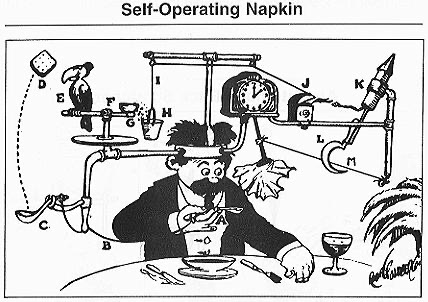UnwieldyMachine

Rube Goldberg:
Professor Butts and the Self-Operating Napkin (1931)
Soup spoon (A) is raised to mouth, pulling string (B) and thereby jerking ladle (C), which throws cracker (D) past toucan (E). Toucan jumps after cracker and perch (F) tilts, upsetting seeds (G) into pail (H). Extra weight in pail pulls cord (I), which opens and ignites lighter (J), setting off skyrocket (K), which causes sickle (L) to cut string (M), allowing pendulum with attached napkin to swing back and forth, thereby wiping chin.
"We're none of us terribly efficient."
©2023 by David A. Schmaltz - all rights reserved
My decades of experience with Systems Thinking leaves me incapable of not thinking of Publishing as just another sort of machine, though it seems at best an UnwieldlyMachine. Some devices, though complicated, seem relatively simple. Not so Publishing. I suspect it acquires its apparent unwieldiness from the human effort embedded within it, for Publishing's never accomplished by the mere flick of a switch. Some pieces have been long automated to various degrees. I'm thinking of Gutenberg and his bible printing machines, but even those required excessive amounts of tedious human effort to produce their product. They represented a quantum leap beyond hand-producing illustrated manuscripts, but they remained tedious as, indeed, has the overall Publishing "system" to this day.
Its necessary mindfulness helps render it Unwieldy, for mindfulness takes time when the whole purpose of systems seems focused upon trimming time from production. We think of saving time as almost godly. We worship efficiency, the science of producing with less effort. We seem downright lazy by nature, though the production of some products seems far, far removed from ease. The artist struggles to produce their products, each instance not necessarily contributing to making the following productions even a little bit more efficient. Such seems Publishing. Reading a manuscript demands that the reader remain conscious and present through the entire duration of the effort, with no sleepwalking or mattress testing involved. Further, each paragraph, each page, seems to demand the same hyper attention, watchful and ready to make the small amendments the finished product always demands. This kind of work remains unconducive to automation.
So Publishing remains defined by its manual labor. Once the press gets configured and loaded up, it produces a jillion pages per minute, but configuring and loading that machine proves painstaking. That's just the nature of the process. Best to set expectations accordingly and pack for a trudge. This work will, at times, demand absolutely undivided attention. I cannot read a manuscript while listening to music. It seems that I must become a monk to properly attend to this work. The slightest distraction finds it too easy to suck me in. I work in a desert sometimes, and even the faint sound of distant water will pull me up and out of my focus. Reengaging then feels tedious. I feel as if I am holding my breath as I read, my brain screaming for something like oxygen to sustain it. I sometimes smother myself in this work.
It seems easy to get lost in this Publishing process, for it features so many details requiring many picky adjustments. It's easy to get disoriented and lost if I don't keep my attention single-threaded. I feel as though I've really accomplished something when I finally (finally!!) finish reading a manuscript, but that's nothing to get anyone all worked up about. There's no appropriate shout-out! to announce when I've advanced to any next stage within this UnwieldyMachine. It seems almost entirely comprised of internet processing. Other than a clean copy of the manuscript, no real milestone marker emerges from the bulk of the process. It's head-down, deeply introverted work that nobody else would ever care about or find interesting.
I catch myself sometimes thinking—a dangerous business when I intended to keep my focus upon re-reading my prose—whether I should feel more elated or delighted or enthusiastic when I'm slogging through some mind-numbing Publishing task. Should I not feel the way I feel when reading something by one of my favorite authors? Should I not be my most favorite author since I sure seem to spend the most time reading my own work? I suspect the Publishing process was never intended to work like that. I'm a more hard-boiled reader and a soft-hearted writer. I do not necessarily publish for enjoyment. It's work for me, and something tells me that it never works to enjoy one's work over much. Work, even the creative sort, might need to seem tedious to properly produce its product. We all work with UnwieldyMachines. We're none of us terribly efficient.


